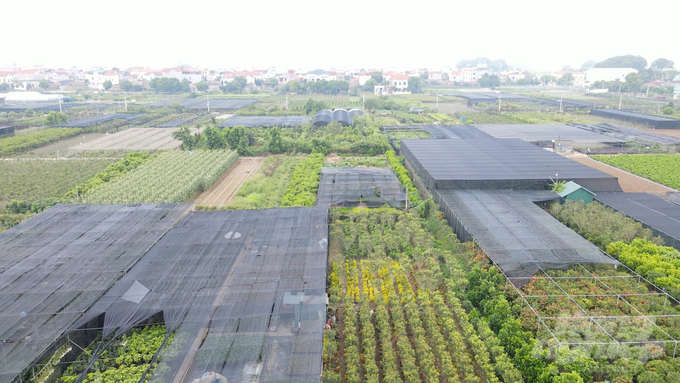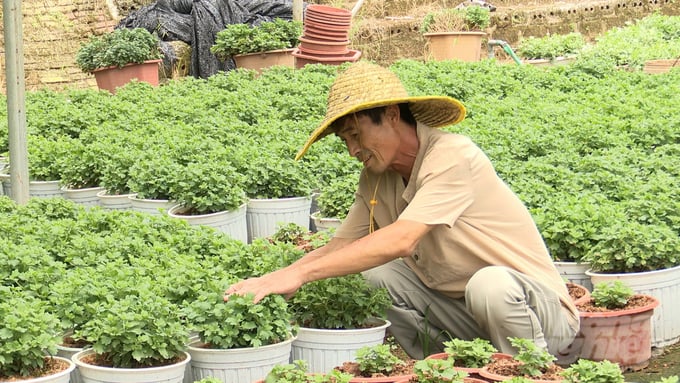June 16, 2025 | 21:15 GMT +7
June 16, 2025 | 21:15 GMT +7
Hotline: 0913.378.918
June 16, 2025 | 21:15 GMT +7
Hotline: 0913.378.918

Urban agriculture helps establish green spaces, increase oxygen levels, reduce greenhouse gas emissions, and provide a local source of food and produce for urban residents. Photo: Duy Hoc.
According to experts and scientists, the rapid pace of urbanization, coupled with infrastructure overload and pollution from cities and industrial zones, has caused significant consequences, including environmental pollution and a shortage of green spaces, water sources, and clean food for urban residents.
With the aim of helping urban residents balance their lives, urban agriculture emerged as both a viable solution and an inevitable global trend, including in Vietnam. This model offers immense benefits, such as establishing green urban spaces, increasing oxygen levels, reducing greenhouse gas emissions, and providing a local source of food and produce for the local residents.
However, the urbanization and industrialization process presents several threats to the current trend of rapid and sustainable development. Notably, numerous agricultural workers have lost their farmland and currently face unemployment; rural populations continue to migrate to large cities in search of jobs, which puts increasing pressure on the demand for food and produce. Additionally, the ongoing risks of soil, water, and air pollution pose unforeseen socio-economic challenges.
Nguyen Van Bo, former Director of the Vietnam Academy of Agricultural Sciences, noted that despite its marginal contribution to the GDP in urban areas (less than 5% in major cities), agriculture plays a crucial role—not only in supplying food and protecting the environment but also in ensuring social stability.
Urbanization is an inevitable trend and a key driver of socio-economic development. As a result, investment in urban agriculture is an investment in four better criteria: better production, better nutrition, a better environment, and better health.
In response to the challenges of climate change and the rising demands of the market, various peri-urban farmers in Hung Yen Province have made the bold decision to transition away from traditional farming methods—which consume significant land, water, and labor resources—by adopting advanced scientific and technological methods to produce high-quality, diverse products that meet market needs.
With limited land resources, several local households have converted to more efficient production methods by introducing new crops and livestock and installing automatic water-saving irrigation systems alongside greenhouse and net house systems. They can also monitor and control their farms via computers or smartphones.

Hung Yen province has implemented various mechanisms and policies to support peri-urban and urban residents in developing agricultural production. Photo: Duy Hoc.
“With the aim of utilizing the potential and benefits of urban agriculture, several rapidly urbanizing regions such as Hung Yen Province have introduced policies to encourage investment in agricultural production. Accordingly, the province has organized programs to support the introduction of new crop and livestock, along with projects for concentrated production areas in compliance with VietGAP and organic standards,” commented Nguyen Van Hanh, Deputy Head of Crop Production at Hung Yen Province’s Department of Agriculture and Rural Development.
Additionally, Hung Yen Province’s Department of Science and Technology has supported several local governments in developing clean and circular agriculture models. The department has also organized numerous trade promotion conferences, facilitating connections between businesses, cooperatives, and farmers to create investment opportunities and streamline the production and distribution of agricultural products.
At present, urban agriculture models in Vietnam are developing along two main paths: formal models (organized production in large spaces such as farms and specialized production areas in suburban regions) and informal models (where households utilize limited residential space for small-scale crop and livestock production).
Hung Yen Province boasts one of the highest rates of urbanization and industrialization nationwide. The rapid pace of these processes has led to a shrinking agricultural land area. Additionally, the declining and aging agricultural labor force is unable to meet the demands of modern production practices.
Consequently, Hung Yen’s agricultural sector has identified the adoption of high technology in production as a viable development trend against the current global background. Accordingly, high technology enables stakeholders to address labor and climate change challenges. As a result, farmers can produce agricultural goods that achieve both high productivity and quality, thereby meeting the increasingly strict market demands.
Hung Yen's provincial plan for the years between 2021 and 2030, with a vision towards 2050, outlines several key tasks, including: restructuring and developing agriculture towards high technology, circular agriculture, organic farming, and ecological agriculture; promoting large-scale, high-value specialized farming; and expanding production areas for flowers, ornamental plants, specialty crops, livestock, and agricultural products that boast the province's competitive advantage.
Translated by Nguyen Hai Long
/2025/06/12/3721-2-202745_83.jpg)
(VAN) TH made an impression at Seoul Food 2025 with its line of natural beverages, paving the way for Vietnamese food products to enter the South Korean market.

(VAN) Soc Trang's success in rice exports stems from a strategy of developing fragrant and specialty rice cultivation areas and standardizing production toward low-emission practices.
/2025/06/11/1311-5-120811_839.jpg)
(VAN) The pig farming industry is facing the challenge of comprehensive restructuring to meet requirements for quality, safety, traceability, and market expansion both domestically and for export.

(VAN) Vietnam considers participating in ALGROALBA in order to expand agricultural production, coordinate the assessment and effective exploitation potential land.
/2025/06/05/5314-1-184727_407.jpg)
(VAN) From seemingly worthless fish scales and skin, enzymes and lactic ferments can transform by-products into peptides, opening a sustainable, effective business direction and elevating Vietnamese seafood.

(VAN) TTC AgriS and IFC signed a strategic partnership to develop a sustainable agricultural value chain, aiming to achieve the Net Zero target by 2035.

(VAN) Seafood by-products are opening a new path, combining green growth and technological innovation to enhance the industry's value.